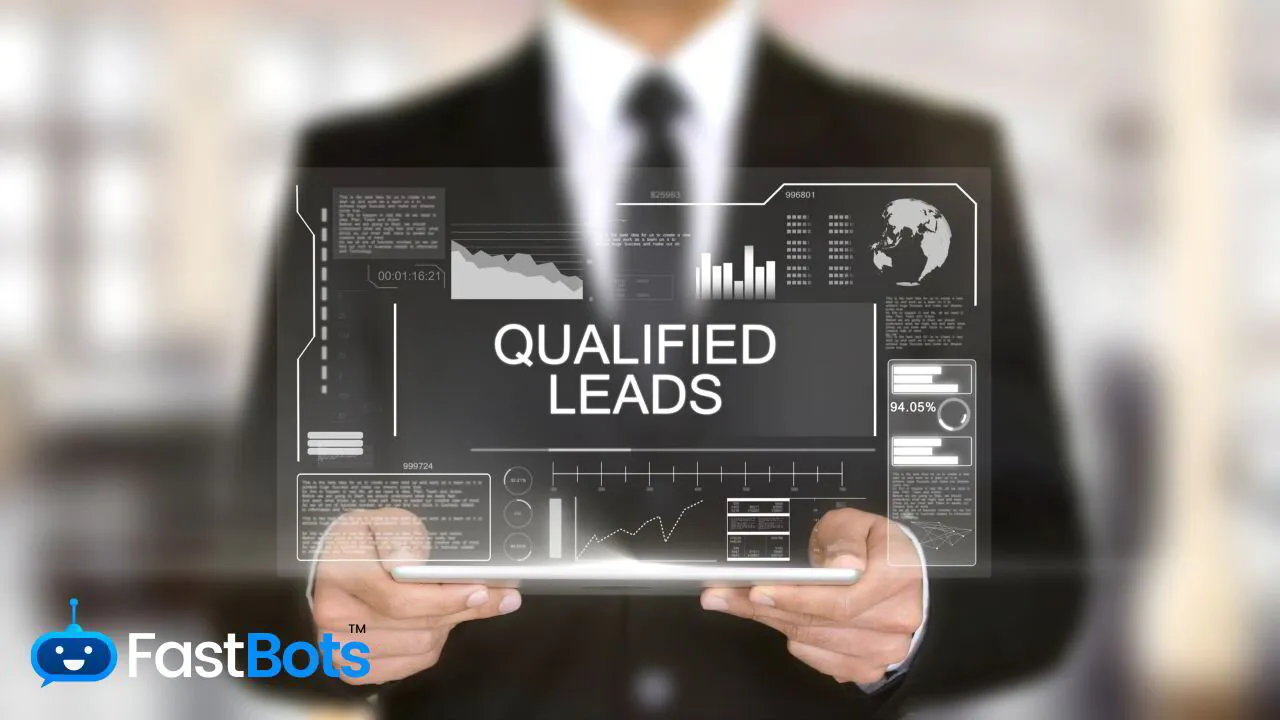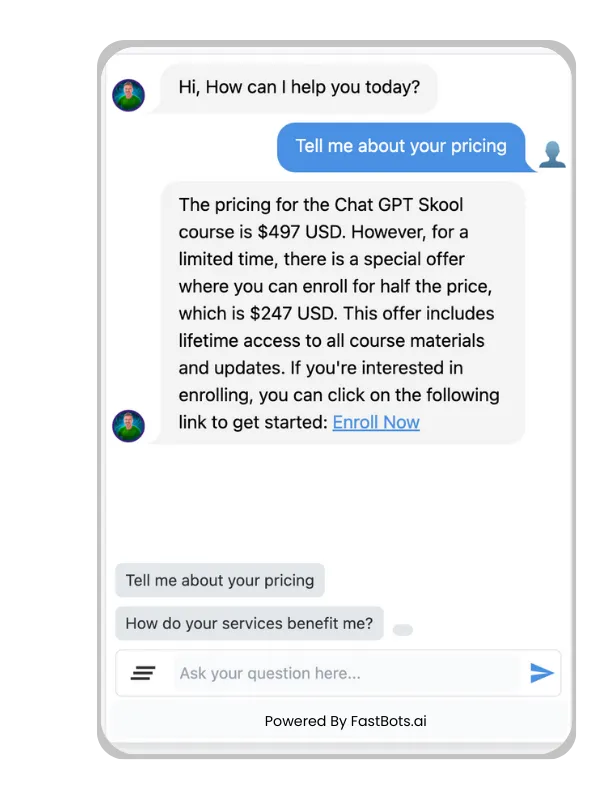In today's fast-paced digital world, businesses need to stay connected with their audience and potential customers. One effective way to achieve this is by leveraging the power of WhatsApp chatbots for lead generation. With over five billion downloads, WhatsApp is one of the most widely used messaging platforms, making it an ideal channel for businesses to reach and engage with their target audience.
WhatsApp chatbots provide numerous benefits for lead generation, such as real-time communication, personalised experiences, and high engagement rates. By utilising chatbots, your business can capture leads while they are actively engaged and interested, ultimately increasing conversion rates and fostering long-lasting relationships with your customers.
The combination of WhatsApp's popularity and the automation capabilities of chatbots presents businesses with an invaluable tool to improve lead generation strategies. In the following sections, we will explore the various benefits of using WhatsApp chatbots for lead generation and discuss how you can effectively implement them in your marketing and sales efforts.
WhatsApp Chatbots Overview
Benefits of Instant Messaging for Businesses
Instant messaging has become an essential part of our daily communication. Businesses can take advantage of this by implementing WhatsApp chatbots for lead generation. With over 2.4 billion active customers, WhatsApp is the world's most popular messaging platform, making it an excellent channel for businesses to reach a broad audience. Here are some benefits of using instant messaging for businesses:
- Wide reach: Reach a diverse and extensive audience across the globe.
- Real-time communication: Engage with potential leads immediately and provide timely responses.
- High engagement rate: Users are more likely to reply to messaging apps than emails or other platforms.
Note: WhatsApp claims that over 100 billion messages are exchanged daily on the platform.
Evolution of Chatbots within Messaging Apps
Chatbots have come a long way since their inception. Initially, they operated on predefined rules, responding to specific keywords, and their use was limited. However, the infusion of artificial intelligence (AI) has significantly amplified their efficacy, and they have evolved to perform a variety of tasks. Let's have a look at the evolution of chatbots within messaging apps:
1. Rule-based chatbots: Early chatbots were designed to answer only a specific set of questions based on rules and keywords.
2. AI-powered chatbots: These chatbots can understand natural language, learn from user interactions, and provide more accurate and personalised responses.
3. Integration into messaging apps: WhatsApp and other messaging platforms like Facebook Messenger and Telegram have incorporated chatbots, allowing businesses to engage with their audience directly through these popular communication channels.
In conclusion, WhatsApp chatbots offer businesses an excellent opportunity to reach a wide audience, engage in real-time communication, and benefit from high engagement rates. With the evolution of chatbots and their integration into messaging apps, businesses can leverage this powerful combination to improve their lead generation strategies and achieve better results.
BUILD YOUR OWN WHATSAPP AI CHATBOT
In less than 5 minutes, you could have an AI chatbot fully trained on your business data assisting your Website visitors.
Lead generation strategies
Incorporating Chatbots into Sales Funnels
Integrating WhatsApp chatbots into your sales funnel can take your lead generation efforts to new heights. Given WhatsApp's high open rates, your messages are more likely to be seen and engaged with by users. To maximise effectiveness, follow these steps:
1. Identify the stages of your sales funnel: Break down your funnel into stages, such as awareness, consideration, and conversion, to understand how chatbots can facilitate transitions between each stage.
2. Design chatbot sequences: Tailor chatbot messages and responses to cater to the specific needs of potential leads at each stage. This will ensure that you provide relevant information and guide them through the funnel.
3. Set up triggers and actions: Install triggers for the chatbot to initiate conversations or take action based on user behaviour, such as visiting a product page or asking a question.
Personalisation and customer engagement
Personalisation is key to successful lead generation. By providing personalised and engaging content through chatbots, you can establish a rapport with prospects and increase the likelihood of conversion. To achieve this, consider these approaches:
- Segmenting your audience: Use the information collected by your chatbots to group potential leads based on characteristics such as preferences, location, or behavior. This will allow you to deliver tailored content that resonates with each segment.
- Crafting personalised messages: Use the collected data to customise chatbot messages, addressing users by their names or referring to previous interactions.
- Engaging in two-way conversations: Implement an interactive approach that allows users to ask questions and receive quick and accurate responses. This not only boosts engagement but also demonstrates your company's dedication to customer service.
By incorporating chatbots into your sales funnel and prioritising personalisation and customer engagement, you're sure to see significant improvements in your lead generation efforts.
Implementing WhatsApp Chatbots
Building Your WhatsApp Chatbot
Before diving into the benefits of using WhatsApp chatbots for lead generation, let's focus on how to create the perfect chatbot for your business. First, identify your target audience by understanding their demographics, preferences, and needs. Your chatbot should serve as a valuable resource that addresses those needs.
Next, design a conversational flow for your chatbot. Organise this flow with the following elements:
- Greeting: Welcome users and introduce your chatbot.
- Menu: Offer a list of topics or services for users to choose from.
- Questions: Ask questions that help you gather information about leads.
- Solutions: Present your products or services based on the user's preferences.
You can also add AI capabilities to your chatbot to enable it to learn from user interactions and enhance its performance over time.
Compliance with WhatsApp Policies
It's crucial to adhere to WhatsApp's policies to ensure the smooth functioning of your chatbot. Here are some guidelines to follow:
1. Consent: Make sure you have the user's permission before initiating a chat.
2. Privacy: Respect user privacy and follow data protection laws, such as the GDPR.
3. Prohibited content: Refrain from sharing content that violates WhatsApp's terms of service, such as spam, harmful information, or misleading content.
By following these guidelines, you can successfully implement a WhatsApp chatbot and reap the benefits of lead generation through this powerful tool.

Analytics and Optimisation
Tracking Performance Metrics
To make the most of your WhatsApp chatbot for lead generation, it is vital to track performance metrics. Regular monitoring of chatbot analytics will provide you with valuable insights into customer engagement patterns. A few essential metrics to track include:
- Conversion Rate: The percentage of users who complete a desired action (e.g., filling out a contact form or making a purchase).
- Response Time: The average time it takes for the chatbot to reply to user messages.
- User Retention: The percentage of users who return to the chatbot after their initial interaction.
- Engagement: The average number of messages exchanged between users and the chatbot during a session.
Creating a dashboard to visualise these metrics can make it easier for you to monitor your chatbot's performance.
Iterative Improvements Based on Data
Using the data gathered from your chatbot's metrics, you can make iterative improvements to enhance its effectiveness in generating leads. Here are some suggestions:
1. Personalisation: Customise your chatbot to offer personalised experiences based on user preferences, previous interactions, and other data points.
2. Natural Language Processing (NLP): Improve your chatbot's ability to understand and respond to user queries by refining its NLP algorithms.
3. User Interface (UI) Enhancements: Identify and implement UI changes that simplify the chatbot experience and increase user satisfaction.
4. A/B Testing: Run experiments to compare different aspects of your chatbot (e.g., greetings, responses, and calls-to-action) to determine which versions yield the best results.
By continuously analysing your chatbot's performance and making data-driven improvements, you can optimise your lead generation efforts and drive better results for your business.
Frequently Asked Questions
How do WhatsApp chatbots enhance customer engagement for businesses?
In what ways can WhatsApp chatbots improve the lead qualification process?
What efficiencies are introduced by integrating chatbots into WhatsApp marketing strategies?
How can WhatsApp chatbots contribute to a higher conversion rate?
Can WhatsApp chatbots provide a personalised experience for potential leads?
What are the cost implications of adopting WhatsApp chatbots for lead nurturing?
BUILD YOUR OWN WHATSAPP AI CHATBOT
In less than 5 minutes, you could have an AI chatbot fully trained on your business data assisting your Website visitors.


